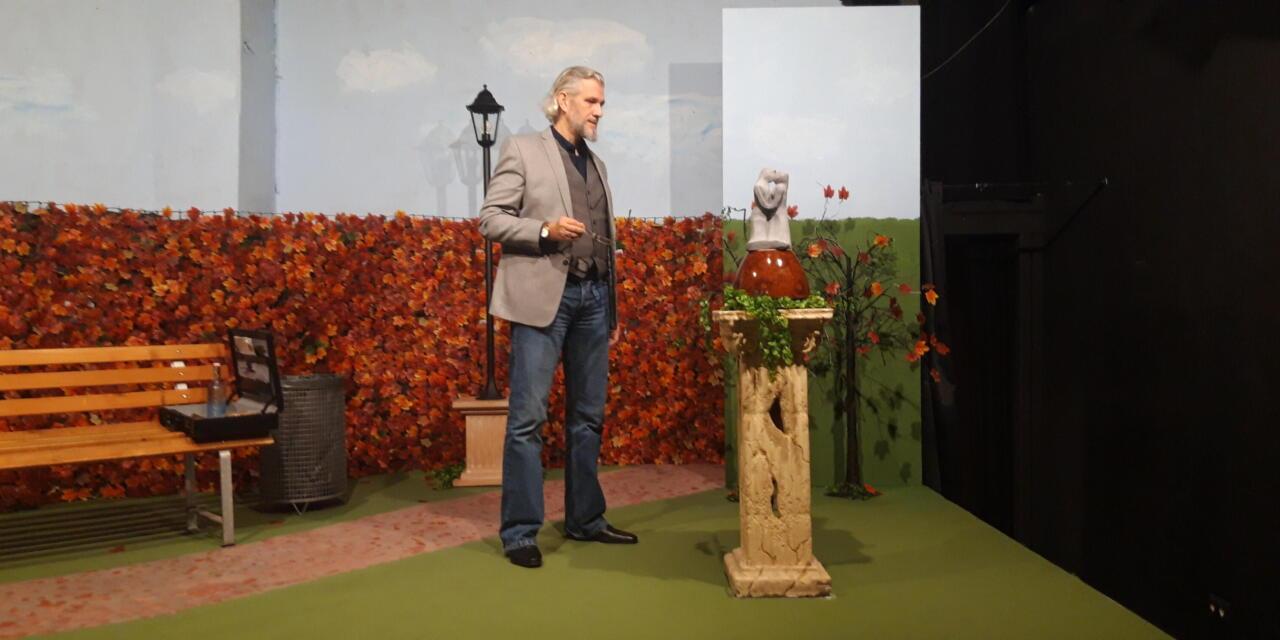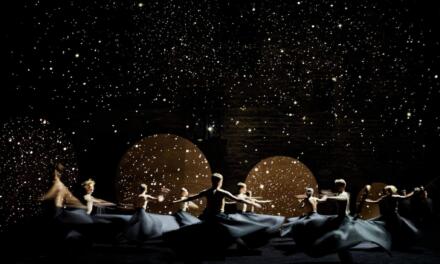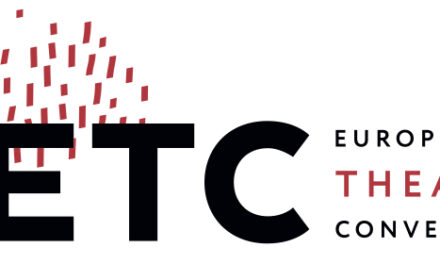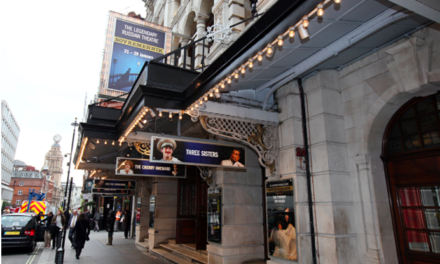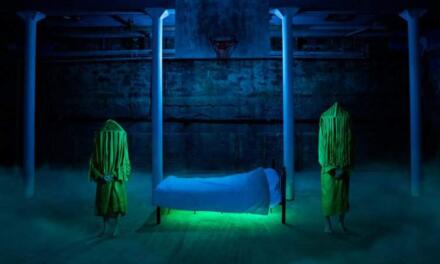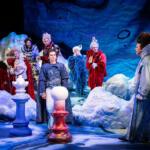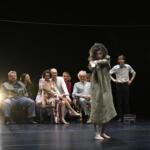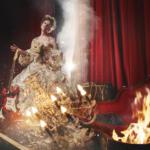Since August 2019, I have owned and run the chamber theatre, piccolo teatro Haventheater, in Bremerhaven. The theatre seats a total of 54; it was founded in 2011 by my predecessor, actor and director Roberto Widmer. We present around six professional productions of our own each season, with around ten performances, and also welcome a number of guest productions for one or two performances. Since 2019, there have been in the region of 600 performances altogether, with a total audience of around 24000.
As one of the first productions during my tenure, I selected Willy Russell’s Educating Rita and cast Cyrus Rahbar to play Frank. He came back to play the sole character in a one-man show, Après Ski – Ruhe da oben! (Après Ski – Quiet up there!) by Klaus Eckel, and to direct Comeback für Noah by Thomas Rau. His partner, Barbara Raue-Flajs, trained as a soprano and pursuing a career as a novelist, presented a rehearsed reading of an excerpt of one of her novels while we were working on Educating Rita, and in 2023 she informed us that she had written her first play, which eventually became Liebe mit Taktgefühl. The title is a pun, literally translated as “love with a feeling of tact”, with tact referring to rhythm and the mode of polite behavior, a double pun because the person whose love we are dealing with in the play is a conductor. The production was scheduled for the autumn of 2025, rehearsals started on 8th September, and the production opened on 19th October, with 12 performances until 9th November. 610 people had seen the production by the end of its run. 11 performances were sold out, and one additional performance allowed all remaining requests for tickets to be met.
The play’s plot is as follows: conductor Maximilian Engelmann is a man in his early fifties. We encounter him in a park, where he delivers a monologue primarily to a statue, though he also addresses the audience directly at times. The statue depicts a kissing couple, and Maximilian attempts to protect both the lovers and the audience from the mistakes he has made—mistakes he increasingly understands, acknowledges, and regrets as the evening progresses—by offering glimpses of his own life. He is very self-assured, confident in his effect on women and in his professional achievements and charisma as a renowned conductor (London, Milan, Vienna, and Prague are mentioned as examples). He loved his wife Helena during their marriage but readily accepted her sacrificing her own career for him. Now he recognizes this as his mistake. He always prioritized his career over his life with Helena, was often away from home, and during the time they were together, talked only about himself—that meant his job—never even listening to her. He now recognizes this as a mistake. Helena essentially raised the children alone—Maximilian realizes this now and feels genuine appreciation for her. He now understands how much he missed, how much he didn’t grasp back then, and how much he would do differently if he could turn back time or if he had another chance with Helena. He also realizes that his hopes for a life after Helena, with new opportunities and newfound freedom, are misleading because he still loves her.
Maximilian tells the statue and the audience why Helena broke up with him: during a tour of South America, Maximilian couldn’t resist the seduction attempts of Dolores, a young, attractive assistant with the tour organization. She gets him very drunk, and he doesn’t resist her performing fellatio on him. After he rejects her, citing his love for Helena, she reacts aggressively. Once Maximilian returns home, Dolores phones Helena, and the deeply hurt Helena learns of the incident. She breaks up with Maximilian that same day. The scene in the park takes place about four months later. Maximilian has arranged a date there (through an online dating platform). At the end of the play, it turns out that the woman he is meeting is none other than Helena: she cancelled the date to give her relationship with her husband, whom she still loves, another chance. Maximilian happily goes home to Helena.
The first draft arrived under the working title of Liebe ist auch nur eine Krankheit, roughly translated as Love, too, is only a disease. From experience I realized right away thar this title would be disastrous in terms of attracting an audience. It was just too negative. A high percentage of my audience is attracted by the announcement of the production in the printed edition of the local newspaper, to the extent that spectators, even long-term regulars, will only book tickets once the production has been thus announced, even if they have seen theatre flyers with that announcement months before. And they will put much emphasis on the title. Ayckbourn’s Intimate Exchanges takes the German title Raucher / Nichtraucher (Smoker / Non-Smoker). Without further explanation, the title does not tell you much about the play, and people are not keen to read too much about the play in the announcement either. The production sold only 2/3 of seats. The German title for Shaffer’s Sleuth is Revanche, a French word. Many seat reservations are made over the phone, and many callers were at best uncomfortable with the pronunciation of the title. The publishers of the German version of Russell’s Shirley Valentine fortunately added St Joan of the fitted kitchen as a subtitle. When we staged the first German production of Tove Appelgren’s Honey, we received permission from the author, translator and publishers to add Eine Frau wie eine Naturgewalt / A women like a force of nature as a subtitle. In phone bookings, 90% of callers referred to the force of nature. A play entitled Was Frauen wollen / What women want, for which the headline of the announcement read Findet Franziska ihren Traummann / Does Franziska find the man of her dreams, was very popular indeed. For Traumfrau verzweifelt gesucht (Desperately seeking dream woman), the word “desperately” put some people off, along the lines of “you had this production with the man who cannot find a woman – I didn’t want to see a play about a loser.” I explained this context to Raue-Flajs, provided some suggestions for the general direction of a different title, and Raue-Flajs came up with Liebe mit Taktgefühl.
The play addresses essential aspects of a relationship crisis. The central character, Maximilian, undergoes a profound transformation: he recognizes many of his mistakes in a way that gives the audience the impression that he deserves a second chance with Helena. For Maximilian, his career, his music, has always been the core of his life, his main focus, at the expense of his family. In my work with actor Cyrus Rahbar it was essential for him to internalize that role of music in his character’s existence. I have always liked to involve relevant “outsiders” in my work, be it in a school context or in the theatre, to bring the subject matter under discussion closer to those I was involved with. For example, in my days of training as a teacher in Germany, I took my A-level philosophy course in a unit on ethics and a focus on genetics to attend a specially arranged meeting with genetics researchers at the nearby university. For my production of Mark St Germain’s Dancing Lessons I arranged for meetings with the head of the local therapy center for autism to work with the actor playing the professor of geoscience who is on the Asperger syndrome spectrum. For Liebe mit Taktgefühl, I arranged a meeting with one of the conductors at the local municipal theatre, Hartmut Brüsch. As Rahbar and I arrived at the stage door for our meeting, still outside, Brüsch rode past us briskly on his bike, and called over: “Don’t go in yet,” placed his bike efficiently in the bike stand, walked over to us, took in Rahbar from head to toe, and said to him: “You will be good at playing a conductor, very convincing.” He then turned to me: “A very good casting decision.” Then he gave the smile I knew from his curtain calls and asked us to follow him past the stage door up three flights of stairs to his top floor office. We settled down and he immediately showed us a collection of batons, including the highly treasured gift of a baton from Carlos Kleiber. We had hoped for some 30 minutes with him. We had 150. Rahbar and I came back to the impressions of this rich experience again and again in the subsequent rehearsal process, and it helped to deepen Rahbar’s portrayal of the conductor character.
How deeply rooted Maximilian Engelmann is in music becomes clear when, in his free moments in the park, he mentally or with the score in hand, reviews the music he is currently working on. In the rehearsal process we added to the material already in the text, in discussion with and approval from Raue-Flajs: Maximilian thus associates situations in his life with excerpts from well-known operatic numbers: Gluck’s “Ach, ich habe sie verloren” (“Ah, I have lost her”) when he thinks about losing his Helena; the Queen of the Night’s revenge aria from The Magic Flute when it comes to Helena’s rage upon learning of the incident between Dolores and Maximilian.
Many of his views on women are highly problematic at best, some even misogynistic. This side of Maximilian is very clearly expressed in the play. It would have been possible to focus on that problematic nature of the character. However, with an eye on my prospective audience I decided to focus on the character’s undeniable charm that perhaps softens those problematic aspects but also makes it all the more dangerous. His attitudes towards women are also shaped by his penchant and talent for witty and clever thoughts, associations, and turns of phrase. Regarding his attitude towards women, a shift is also noticeable in the play, away from potentially misogynistic positions. He was not an ideal man, and he isn’t at the end of the play either, but at least he is a man whose transformation is believable, and one can therefore wish him success in his new beginning with Helena. Working with Rahbar on this interpretation of the character was the most challenging task of the rehearsal process for both of us, because Rahbar’s comfort zone as an actor so far has been the excellent portrayal of uncompromising sadness, suffering, and agony. Increasing the depth of understanding Maximilian’s nature, the nature and the role of music in this context, the exciting juxtaposition and balancing of opposites in and through music, helped in this process. The core idea became that of “lightness, ease,” and a look at the nature of language of French drama, such as that of Eric-Emmanuel Schmitt, or many French films also helped to convey and get the idea of lightness and ease and to allow it to influence the rendering of the text on stage.
The play is not a boulevard comedy where laughter is the main focus. Rather, the text of this serious plot, with its believable characters, is interspersed with opportunities to smile and laugh. These opportunities are an integral part of the play, arising organically from the situations, being part of the whole, and not imposed from the outside. The audience can respond to these opportunities or not – whether thoughtfulness or amusement and laughter prevail depends on the audience’s state of mind and provides no basis for judging the play or the audience.
Many of the situations the play addresses, many of the arguments Maximilian makes, are also found in typical clichés about love and interpersonal relationships. The deliberate and skillful use of these clichés brings the content closer to the audience: for the initial recognition, in the sense of “Aha, so this is about …”. But as soon as this fundamental level of understanding is reached, the play distances itself from the cliché. The superficial universality inherent in the cliché is discarded. Instead, the theme (which referenced the cliché, and which the cliché referenced) is specifically related to the characters in the play and developed in depth within this concrete context.
Cyrus Rahbar has developed an enormous range of acting skills for the role of Maximilian Engelmann. He spends a lot of time sitting on the bench, but he frequently changes his position: leaning back elegantly, thoughtfully or anxiously covering his eyes with his hand, leaning eagerly forward, gazing at the audience, the statue, the surroundings, the sky, his water bottle, his cell phone, his glasses, his score. (As an aside: Rahbar skillfully integrated the act of drinking—necessary for him as an actor—into the organic flow of the plot, the text, and the character during the two parts of the evening, each lasting approximately one hour with a 15-minute intermission.)
Occasionally, Rahbar gets up and walks around, perhaps to see if his date is coming, or to take a closer look at the statue. Every movement is organically coordinated with the content of the piece, with the respective text. His eyes bring the text to life, expressing, alternately and in rapid succession, hope, slowly building, luxuriant sentimentality, sudden memories, self-criticism, insight, thoughtfulness, flashes of inspiration, witty associations, and occasionally a sly address to the audience to seek their confirmation of his stated view. Rahbar places great emphasis on his voice and language. He has recognized, felt, and internalized the text’s inner rhythm, and through this precisely employed acting technique, he can convey the nuances of Maximilian’s emotional state accurately, aptly, organically, and thus very effectively at every moment.
This post was written by the author in their personal capacity.The opinions expressed in this article are the author’s own and do not reflect the view of The Theatre Times, their staff or collaborators.

